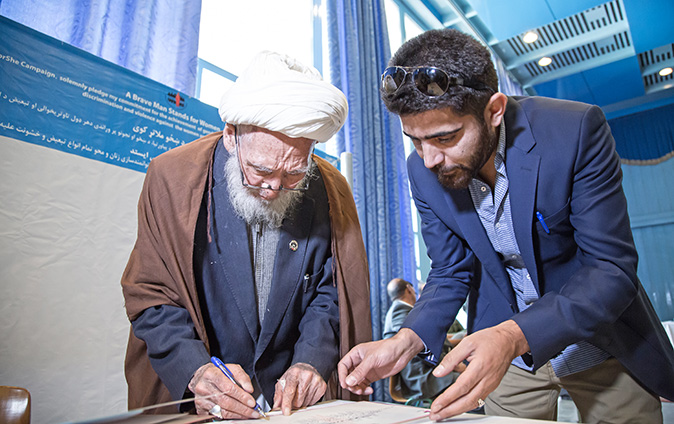Results at a Glance

Afghan men sign on to the HeForShe campaign at the official launch in Kabul in June 2015. Photo: UN Women/Yusuf Azarm
Violence against women – protection and prevention
- In 2015 more than 2,800 women and children affected by violence accessed shelter, psychosocial and legal support, and vocational training through UN Women-funded Women’s Protection Centres.
- Since its launch in Afghanistan in June 2015, the HeForShe campaign has involved more than 2,400 people – mostly men – across 10 provinces and five education institutes, with more than 600 men signing up to support the campaign. These events have provoked discussion and debate about the attitudes and behaviours that perpetuate and validate violence against women, and what men and boys can do in their own communities to support change.
- UN Women-supported awareness-raising on the consequences and causes of violence against women, related women’s rights legislation, and the Islamic sharia laws that forbid violence reached more than 8,820 people (almost 60 per cent women) in 2015. Participants included women, men, girls and boys, students, teachers, community members and members of shuras (Community Councils) in the villages.
Normative support
- With UN Women’s support, Afghanistan became only the second country in South Asia to have a National Action Plan on UNSCR 1325. The NAP was developed by the Ministry of Foreign Affairs and was endorsed and launched in 2015. UN Women continues to support the Government in implementing the NAP, which helps the government meet its obligatory responsibilities to advance the Women, Peace and Security agenda. In addition, UN Women also helped raise awareness on the NAP within provincial government and the public across the country by supporting its launch and dissemination in seven regions.
- UN Women supported the Ministry of Foreign Affairs and the Ministry of Women’s Affairs in the coordination and preparation of the Interim CEDAW Report.
Women’s economic empowerment
- Approximately 438 rural women and girls graduated from four UN Women-supported information and communications technology (ICT) centres in the provinces of Baghlan, Daikundi and Parwan in 2015. Since 2011 when the ICT centres began operating, 1,790 women and girls have enrolled and 1,264 graduated. So far 141 graduates have secured employment, mainly as school teachers or with governmental or non-governmental organizations (NGOs).
- On 6 December 2015, UN Women launched a six-month internship programme for female university graduates. A total of 48 graduates recently finished their two months of training and four-month internship placing with either a government department, NGO or UN agency; several have received offers of employment and most have gained valuable experience and skills to help them compete in the job market.
- Over the past two years, UN Women has supported xx women entrepreneurs to display their products at the International Trade Fair in India, providing them an opportunity to access export markets, widen their networks and learn from other entrepreneurs. One entrepreneur in particular – Atefe Mansoori – not only earned considerable profits from selling her saffron at the Fair, but also signed two international contracts.
- More than 120 female entrepreneurs and businesswomen from across Afghanistan’s 34 provinces gathered for a workshop that encouraged them to share their experiences with one another and learn from each other’s successes and failures.
Coordination
- Under the leadership of UN Women and the Norwegian Refugee Council, the Gender in Humanitarian Taskforce initiated a gender analysis of the humanitarian response to the 2015 Kunduz offensive. The resulting report provides an evidence base to advocate for more effective humanitarian action that reaches even the most marginalised women.
- The newly-developed National Action Plan to make UN Security Council Resolution 1325 a reality on the ground sets out a pathway for how Afghanistan will support women’s participation in peace negotiations and post-conflict reconstruction, and protect their rights. Its effectiveness will depend on monitoring and implementation, and UN Women is providing technical support to ensure this happens.
- UN Women plays a key role in coordinating government activities related to the Commission on the Status of Women (CSW). Through UN Women’s facilitation, the Inter-Ministerial Committee is now a permanent body chaired by the Ministry of Women’s Affairs, which will regularly meet to follow up on CSW recommendations.
- As result of ongoing co-ordination between the Ministry of Women’s Affairs, Central Statistical Office and the statistics units and with the capacity building efforts of the ACO Programme, the Central Statistical Office has included gender disaggregated data in eight new areas for their statistical quarterly reports and yearly hand book.
Latest news
25/04/2024
23/04/2024